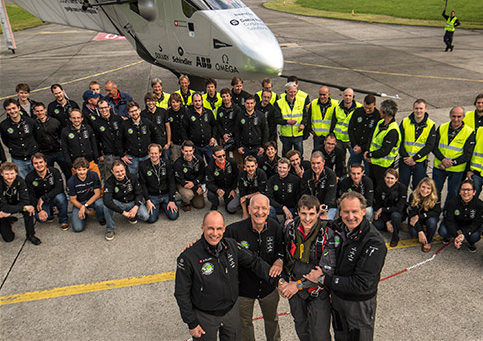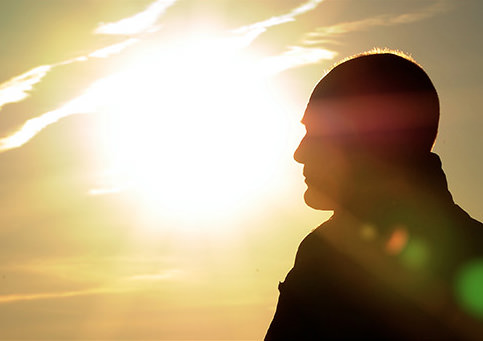
.................................................................................................................................................................
Solar Impulse Foundation
OUR ADVENTURE
 In 2015 started the
attempt of the First Round-The-World Solar Flight, from Abu Dhabi to Hawaii,
already achieving the longest solo solar flight ever achieved in aviation
history.
In 2015 started the
attempt of the First Round-The-World Solar Flight, from Abu Dhabi to Hawaii,
already achieving the longest solo solar flight ever achieved in aviation
history.
In 2016, Bertrand
Piccard and André Borschberg, our two Pilots and Founders, completed the first
circumnavigation of the globe with no fuel.
With their solar
aircraft, a flying laboratory full of clean technologies, they flew 40,000 km
to promote the use of renewable energies and energy efficiency on the ground,
for a better quality of life.
Across the
Round-The-World flight, the team overcame technical, human and operational
challenges that had never been faced before.
After the 8 world records set by the Solar Impulse
prototype, when it became the first solar airplane ever to fly through the
night, between two continents, and across the United States, Bertrand Piccard
and André Borschberg accomplished the ultimate phase of the adventure: the
2015-2016 First Round-The-World Solar Flight.
40,000 km from Abu Dhabi, our departure and arrival Host
City, to India, Myanmar, China, Japan, U.S.A and back to Europe and Abu Dhabi.
As
with all great firsts, there were no benchmarks. Strategies had to be invented
from scratch to allow Solar Impulse 2 to fly across the Pacific for 5
consecutive days and nights, and become the first solar airplane to accomplish
an oceanic crossing.
This
historic and record-breaking flight from Japan to Hawaii was achieved by André
Borschberg in July 2015, proving that clean technologies can accomplish
incredible things.
Bertrand
Piccard then finished crossing the Pacific, and flew over the Atlantic, making
Si2 furthermore the first solar plane to have crossed the world’s two biggest
oceans.
.
Because it is not possible to fly over oceans and continents in a single attempt, the solar airplane is doing its round-the-world flight in a total of about ten stages.
.
Because it is not possible to fly over oceans and continents in a single attempt, the solar airplane is doing its round-the-world flight in a total of about ten stages.
These stops give
the plane respite before setting off again. They also allow the pilots to take
over from each other, as the plane is a singleseater: the only seat in the
cockpit is the one for the person at the controls.
Departure
time and location for the round-the-world flight have not been decided by
chance. The plane needs good weather in order to fly.
The
month of March is early enough in the year to avoid flying over India during
the monsoon; a season in which the winds blow very hard and the rains are
abundant.
The
Arabian Gulf region has been chosen because it has constant sunshine, which is
needed to charge the plane with solar energy.
To
determine the flight path that Solar Impulse will take in the sky, many factors
must be considered: weather, air traffic areas, also the height of the land to
be flown over and the performance of the airplane.
A team
of engineers and meteorologists based in Monaco Mission Control Center (MCC)
determines the best route for the plane and then prepares the flight plan.
Once the route is chosen, overflight and
landing clearances must be negotiated for each country.
Abu Dhabi, Arrival and Departure Host City.
Abu
Dhabi, capital city of the United Arab Emirates, will be the start and finish
of the first solar powered flight around the world.
Masdar,
Abu Dhabi’s renewable energy company, is the host partner of Solar Impulse.
The
team was hosted by Masdar and Abu Dhabi at the start of January for testing and
training before the start of the first solar powered flight around the world.
Si2 was
delivered in Abu Dhabi by cargo plane from the Payerne aerodrome in Switzerland
on January 6th and has been showcased during the World Future Energy Summit as
part of the Abu Dhabi Sustainability Week, which is hosted by Masdar between 17
and 22 January 2015.
“This well matched partnership will show Abu Dhabi to be a
centre of expertise when it comes to renewable energy and at the same time
Solar Impulse will demonstrate the far reaching applications of clean energy
during the first solar powered flight around the world,” declared Bertrand
Piccard.
 André Borschberg
continued: “We have chosen this location as being the best and most suitable
departure point for the round-the-world tour, due to its climate,
infrastructure and commitment to clean technologies.”
André Borschberg
continued: “We have chosen this location as being the best and most suitable
departure point for the round-the-world tour, due to its climate,
infrastructure and commitment to clean technologies.”
Two
men, both pioneers, innovators and pilots, are the driving force behind Solar
Impulse.
Bertrand
Piccard, a medical doctor specialized in psychiatry, explorer and aeronaut, who
made the first non-stop round-the-world balloon flight, is the initiator and
chairman.
André Borschberg, an engineer and
graduate in management science, a fighter pilot and a professional airplane and
helicopter pilot, is the co-founder and CEO.
The
former’s avant-gardist vision and the latter’s entrepreneurial and managerial
experience are an ideal combination.
« If governments had the courage to promote clean
technologies on a massive scale, our society could simultaneously reduce its
dependence on fossil fuels, create jobs and stimulate sustainable growth. » Bertrand Piccard
« Building teams is both art and science. The value of
talent is created through differences, not similarities. » André Borschberg
ABOUT US
Let’s
run the world with clean technologies The three record-breaking solo flights of
André Borschberg from Nagoya to Hawaii and Bertrand Piccard from Hawaii to San
Francisco and later New York to Seville give a clear message: everybody could
use the same technologies on the ground to halve our world’s energy
consumption, save natural resources and improve our quality of life.
To take the success of the solar-powered flight around the
world further, the Solar Impulse Foundation is selecting 1000 solutions
that protect the environment in a profitable way and awarding them the Solar
Impulse Efficient Solution Label.
The
Solar Impulse Efficient Solution label seeks to bridge the gap between ecology
and economy, bringing together protection of the environment and financial
viability to show that these solutions are not expensive fixes to problems, but
rather opportunities for clean economic growth.







No comments:
Post a Comment